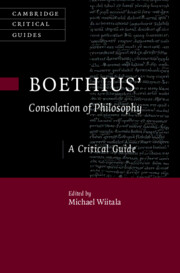Book contents
- Boethius’ Consolation of Philosophy
- Cambridge Critical Guides
- Boethius’ Consolation of Philosophy
- Copyright page
- Contents
- Contributors
- Abbreviations of Boethius’ Works
- Introduction
- Chapter 1 Boethius’ Philosophiae consolatio
- Chapter 2 The Ascent from Π to θ, or On Philosophy’s Teaching a Blind Man to See
- Chapter 3 Lady Philosophy as a Feminine Personification of Wisdom
- Chapter 4 Boethius’ Christianity in the Consolatio
- Chapter 5 The Blending of Pagan and Christian Elements in Book III of the Consolatio
- Chapter 6 The Human Person in the Consolation of Philosophy
- Chapter 7 Self-Investigation, Self-Knowledge, and Inner Conflict in Boethius’ Consolation of Philosophy
- Chapter 8 What It Means to Be a God
- Chapter 9 A Consolation through Philosophical Insight?
- Chapter 10 Being and Existence in the Consolation of Philosophy
- Chapter 11 Circle and Sphere Metaphors for God’s Nature and Providence in Boethius’ Consolation of Philosophy and Dionysius’ On Divine Names
- Chapter 12 Time and Eternity in the Consolation of Philosophy
- Chapter 13 Boethius on Human Freedom and Divine Foreknowledge
- References
- Index
- Cambridge Critical Guides
Chapter 8 - What It Means to Be a God
Providence and Punishment in the Consolation of Philosophy
Published online by Cambridge University Press: 23 May 2024
- Boethius’ Consolation of Philosophy
- Cambridge Critical Guides
- Boethius’ Consolation of Philosophy
- Copyright page
- Contents
- Contributors
- Abbreviations of Boethius’ Works
- Introduction
- Chapter 1 Boethius’ Philosophiae consolatio
- Chapter 2 The Ascent from Π to θ, or On Philosophy’s Teaching a Blind Man to See
- Chapter 3 Lady Philosophy as a Feminine Personification of Wisdom
- Chapter 4 Boethius’ Christianity in the Consolatio
- Chapter 5 The Blending of Pagan and Christian Elements in Book III of the Consolatio
- Chapter 6 The Human Person in the Consolation of Philosophy
- Chapter 7 Self-Investigation, Self-Knowledge, and Inner Conflict in Boethius’ Consolation of Philosophy
- Chapter 8 What It Means to Be a God
- Chapter 9 A Consolation through Philosophical Insight?
- Chapter 10 Being and Existence in the Consolation of Philosophy
- Chapter 11 Circle and Sphere Metaphors for God’s Nature and Providence in Boethius’ Consolation of Philosophy and Dionysius’ On Divine Names
- Chapter 12 Time and Eternity in the Consolation of Philosophy
- Chapter 13 Boethius on Human Freedom and Divine Foreknowledge
- References
- Index
- Cambridge Critical Guides
Summary
When Lady Philosophy suggests that Boethius’ definition of himself as a rational mortal animal is inadequate, it implies that a superior self-understanding is contained within the Consolation. This chapter argues that this more adequate self-understanding – that Boethius, via participation in God, is himself divine – is implicit in the text and unpacks the profound implications and consolations of this interpretation of the self. Being a rational animal is more than being this specific living thing; it is also an opportunity to manifest divine intelligibility and goodness in the world. The chapter focuses on two perplexing arguments in Book IV that are unsatisfying without this interpretation of Boethius’ identity: that the punished are happier than those who escape punishment and that it is possible to attach ourselves to Providence and escape from Fate. The difficulties that most people will face in accepting these arguments are the direct result of the challenge of adopting this self-interpretation.
- Type
- Chapter
- Information
- Boethius’ ‘Consolation of Philosophy’A Critical Guide, pp. 135 - 152Publisher: Cambridge University PressPrint publication year: 2024



